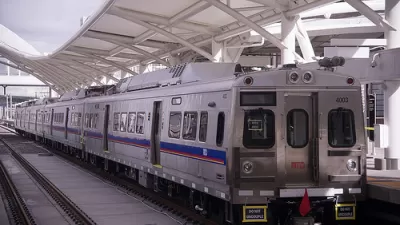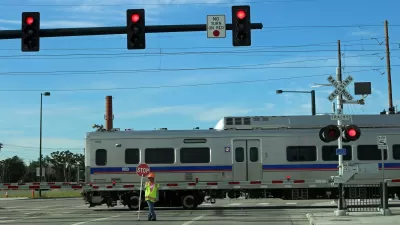Recent problems on the commuter rail operations contracted out by the Massachusetts Bay Transportation Authority and Denver's Regional Transportation District caught the eye of Governing's transportation and infrastructure reporter.
Denver's recent problems with crossing gates on its new A and B Lines were posted here on Nov. 9. Had it not been for a waiver granted by the Federal Railroad Administration on Nov. 5, both lines, which began operation this year, would have shut down.
In addition to a fine for missing on-time performance, "Denver Transit Partners, the private company that oversees the rail,...has had to pay $250,000 a month for signaling issues, or about $1.25 million so far," reports Daniel C. Vock for Governing, referring to the 'flaggers' needed at grade crossings because the gates have not been performing correctly.
“We’re in a bit of a world of hurt," said John Thompson, the executive project director of Denver Transit Partners. "There’s no question about that, because we didn’t see that we’d be faced with these deductions when we bid these contracts six years ago."
In Boston, the Massachusetts Bay Transportation Authority (MBTA) is in the third year of an eight- to 12-year contract with Paris-based Keolis Commuter Services. The company, also has contracts with Virginia Railway Express (VRE) and bus operations in other states.
"Keolis has paid more than $12 million in fines in its first two years of running commuter rail for MBTA," reports Volk. This year it has paid another $1 million in fines.
While the fines may not seem like much in the context of a 12-year deal worth roughly $4.2 billion, Keolis has said that it is losing money on its Boston-area service.
At the same time, Keolis boasts of setting a recent record for on-time performance rate for all lines. Similarly, before things went south in Denver, the A Line received kudos for its electrified, level-boarding service, complete with positive train control, a first for commuter rail lines.
If private contractors are to take the blame for commuter rail problems, who takes the blame for agency-operated services? New Jersey Transit comes to mind, and Metro-North's safety record has been criticized by the Federal Railroad Administration.
Related in media:
- Complete Colorado: RTD’s unreliable A-Line: How flawed incentives lead to poor performance,
November 22, 2016
Related in Planetizen
FULL STORY: Private Companies Face Big Fines for Commuter Rail Problems

Planetizen Federal Action Tracker
A weekly monitor of how Trump’s orders and actions are impacting planners and planning in America.

Maui's Vacation Rental Debate Turns Ugly
Verbal attacks, misinformation campaigns and fistfights plague a high-stakes debate to convert thousands of vacation rentals into long-term housing.

Restaurant Patios Were a Pandemic Win — Why Were They so Hard to Keep?
Social distancing requirements and changes in travel patterns prompted cities to pilot new uses for street and sidewalk space. Then it got complicated.

In California Battle of Housing vs. Environment, Housing Just Won
A new state law significantly limits the power of CEQA, an environmental review law that served as a powerful tool for blocking new development.

Boulder Eliminates Parking Minimums Citywide
Officials estimate the cost of building a single underground parking space at up to $100,000.

Orange County, Florida Adopts Largest US “Sprawl Repair” Code
The ‘Orange Code’ seeks to rectify decades of sprawl-inducing, car-oriented development.
Urban Design for Planners 1: Software Tools
This six-course series explores essential urban design concepts using open source software and equips planners with the tools they need to participate fully in the urban design process.
Planning for Universal Design
Learn the tools for implementing Universal Design in planning regulations.
Heyer Gruel & Associates PA
JM Goldson LLC
Custer County Colorado
City of Camden Redevelopment Agency
City of Astoria
Transportation Research & Education Center (TREC) at Portland State University
Jefferson Parish Government
Camden Redevelopment Agency
City of Claremont




























